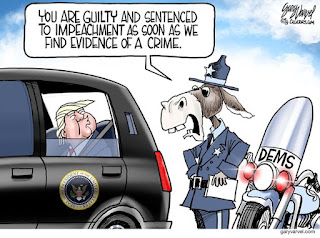Friday, September 27, 2019
Wednesday, September 25, 2019
Tuesday, September 24, 2019
Monday, September 23, 2019
Saturday, September 21, 2019
Friday, September 20, 2019
Thursday, September 19, 2019
Wednesday, September 18, 2019
Tuesday, September 17, 2019
Five Things People Still Get Wrong About Slavery - Vox
In August 1619, the first ship with “20 and odd” enslaved
Africans arrived on the shores of Virginia. Four hundred years later,
we look back at this moment as the start of an enduring relationship
between the founding of the United States and the unconscionable
exploitation of the enslaved.
In a sweeping project published by the New York Times Magazine
this month exploring the legacy of slavery, Nikole Hannah-Jones wrote,
“[The enslaved] and their descendants transformed the lands to which
they’d been brought into some of the most successful colonies in the
British Empire. ... But it would be historically inaccurate to reduce
the contributions of black people to the vast material wealth created by
our bondage. Black Americans have also been, and continue to be,
foundational to the idea of American freedom.”
Yet centuries later, the lasting impact of slavery
continues to be minimized and myths continue to flourish. For instance,
there’s the erasure of the many slave revolts and rebellions that
happened throughout the nation, perpetuating the lie that the enslaved
were docile or satisfied with their conditions. There’s also the
persistent idea that black labor exploitation is over, when mass
incarceration still keeps millions of black Americans behind bars and
often working for “wages” that amount to less than $1 an hour. Then
there’s the idea that our understanding of slavery is accurate based on
what we learned in history textbooks, when in reality, misinformation
continues to be taught in our public schools about slavery’s legacy.
To unpack what often gets mistold or misunderstood, we
asked five historians to debunk the biggest myths about slavery. Here’s
what they said, in their own words.
Read more:
The 1619 anniversary: 5 things people still get wrong about slavery - Vox
Saturday, September 14, 2019
How The Federal Government Nullified the Second Amendment to 'Ban' Automatic Firearms
There are two competing theories being debated today about American individuals’ “right” to gun ownership.
The
original theory is that Americans enjoy a fundamental right to
self-defense, in order to preserve one’s person and property against any
neighbors or government agents who might act against one’s individual
liberty. This is a natural right that predates our
government’s formation, and was therefore enshrined in the Constitution
by some very forward-thinking liberals of their time. In the words of the Second Amendment:
A
well-regulated militia, being necessary to the security of a free
state, the right of the people to keep and bear arms, shall not be
infringed.
It
should not be difficult for anyone with a passing grasp of the English
language to understand that it is the “right of the People” that is
protected in that sentence, and it is clearly not the
expression of a peculiar power owned by the newly-founded centralized
government created by our Constitution. Such straightforward, simple
language in our Bill of Rights was actually suggested
by Samuel Adams and John Hancock to accommodate the antifederalists at
the Massachusetts Convention of 1788 and to avoid confusion about the
new government’s limited powers, meant to guarantee
that “the Constitution shall never be construed… to prevent the people
of the United States who are peaceable citizens from keeping their own
arms.”
Adams
thought far too much of future generations, clearly, because a second,
competing theory has emerged within the last 100 years which suggests
that gun ownership is not a right, but a privilege granted by
the government, and the kinds of firearms allowed to peaceable citizens
depends on what neighbors and government agents would deem allowable at
any particular point in time.
The
latter is entirely incoherent when contextualized with the words the
Second Amendment, but that doesn’t matter, because it’s the position
that is broadly recognized as truth for most Americans. Today, it’s
just natural to assume that the federal government has the right to
curtail gun ownership of this gun or that one among “peaceable citizens”
if the federal government feels that some guns are too dangerous for
law-abiding citizens to own.
This
is the progressives’ magic trick, and some Americans fall for it due to
a simple deficiency in human nature. For example, Chris Cuomo of CNN
recently tweeted
that “[t]here was no individual right” in the Second Amendment even
“contemplated” until Antonin Scalia inferred the “individual right” in
the Heller v. District of Columbia decision.
Read more:
Friday, September 13, 2019
Thursday, September 12, 2019
Anti-Gun Laws Will Never Solve Gun Violence in America
Despite of what the left-wing media wants you to believe, there is not an epidemic of mass shootings, or an epidemic of gun violence in general, in the United States. The data make this clear.
In fact -- and again, in spite of what many in the media would have us believe -- by many accounts, mass shootings are not even on the rise. Definitions of what constitutes a “mass shooting” vary, but using “standard definitions,” a recent piece in The Conversation -- an academic and research journal -- declares that “Mass shootings aren’t growing more common.”
In support of this conclusion, The Conversation article references data presented in USA Today:


Read more:
Anti-Gun Laws Will Never Solve Gun Violence in America
Wednesday, September 11, 2019
Subscribe to:
Comments (Atom)





















































